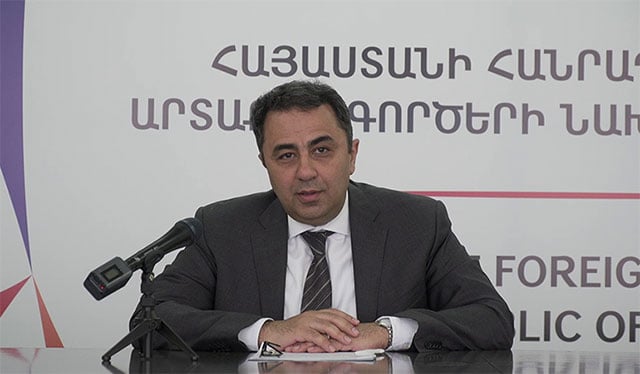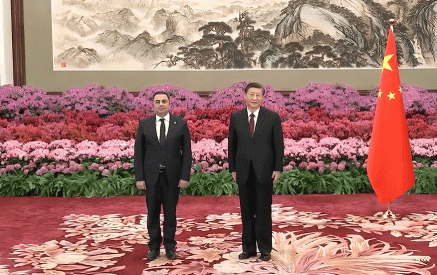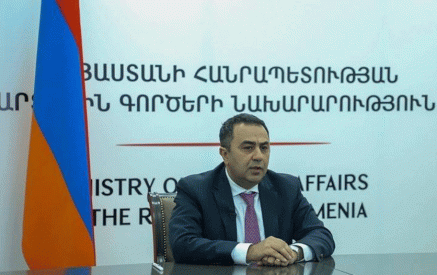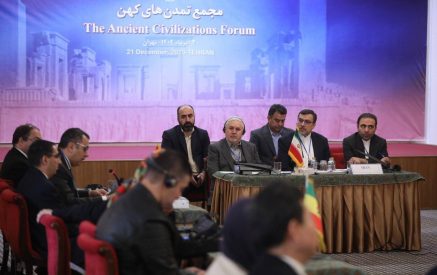Deputy Minister of Foreign Affairs of Armenia Vahe Gevorgyan participated at the High Level Political Forum on Sustainable Development under the auspices of the ECOSOC
Deputy Foreign Minister of Armenia Vahe Gevoryan participated and made remarks during the High Level Political Forum on Sustainable Development under the auspices of the ECOSOC.
In his remarks Vahe Gevorgyan particularly noted that this forum is another opportunity to emphasize the commitment of Armenia to the 2030 Agenda, its goals and targets to build a better, safer and cleaner world for all.
Read also
The Deputy Minister emphasized that during recent years the Armenian government has been taking active measures to synchronize the national strategies and action plans with the goals and targets of the 2030 Agenda, and despite the pandemic and the 44-day war, continues to implement large-scale reforms in the country with the aim of creating safe, equal and democratic environment.
Statement by Deputy Minister of Foreign Affairs Vahe Gevorgyan at the High Level Political Forum on Sustainable Development under the auspices of the ECOSOC
President,
Excellences,
Ladies and gentlemen,
It is a pleasure to address the Ministerial Segment of the High-Level Political Forum on Sustainable Development.
This Forum is yet another opportunity to recommit to the 2030 Agenda, its goals and ambition to have a better, safer, cleaner world for all.
We reiterate Armenia’s full support and commitment to the Sustainable Development Goals. Over the past few years the Government of Armenia has been taking active measures to synchronize the national strategies and action plans with the goals and targets of the 2030 Agenda, with the ultimate aim of creating a safe and democratic environment for our citizens and ensuring their equal rights, freedoms and livelihood opportunities.
Certainly, the global coronavirus pandemic thwarted our efforts to secure sustainable development. The economic impact of COVID-19 pandemic, and particularly its effect on developing countries and countries in special situations, the initial unavailability of vaccines, and the overall shift of priorities have limited our joint action towards reaching the Sustainable Development Goals.
Now, as we have overcome what we can call the “pandemic shock”, it is indeed time to recommit to the full realization of the Sustainable Development Goals.
Despite the pandemic and conflict, particularly the 44-day war in Nagorno-Karabakh, that Azerbaijan instigated despite the appeal of the Secretary-General for a global ceasefire in time of pandemic, Armenia has continued implementing the far-reaching reforms that we have envisaged for the country.
Ladies and gentlemen,
Quality education is key in building resilient and creative societies. The Government of Armenia has launched discussions on a new State Program for Development of Education by 2030 to foster societal transformation, to provide youth with digital literacy, access to information and communications technologies and to ensure lifelong learning opportunities.
The issues related to gender equality similarly remain at the forefront of our reform agenda. Women’s empowerment, along with inclusion and equal participation in all aspects of public life is a key priority for Armenia.
In terms of environment, Armenia is the 4th most vulnerable country to climate change in Eastern Europe and Central Asia region and faces many challenges related to environmental degradation. We are taking active measures towards safeguarding the threatened ecosystems and meeting our international commitments. We have been actively engaged in international cooperation aimed at reinvigorating support to the implementation of environmental programs on screening of potential impacts and mitigation capacities.
Dear colleagues,
By adopting the 2030 Agenda, the global community made a pledge to leave no one behind. We should remain faithful to this pledge and make sure that development is available for all, notwithstanding their nationality, or lack thereof, location or status. People living in conflict zones are among the most vulnerable groups of people, devoid of official development assistance or international cooperation. We must all strive to ensure their development and their rights without any discrimination.























































